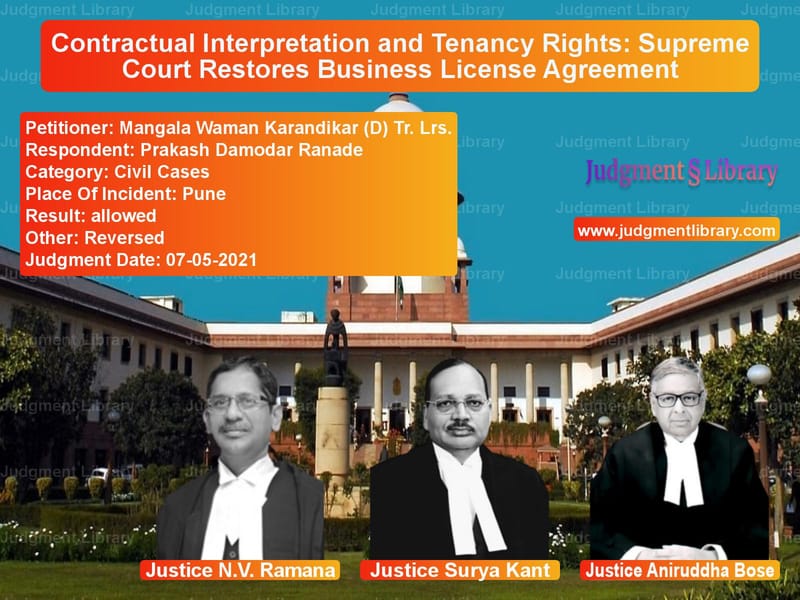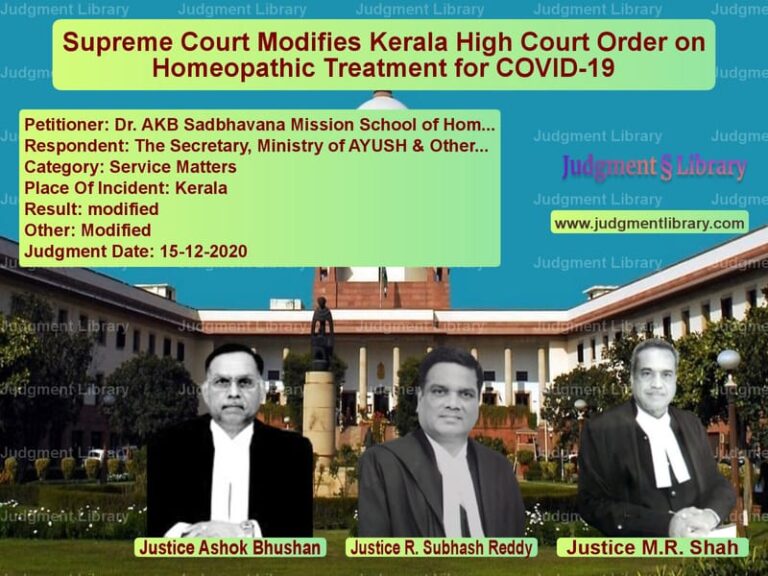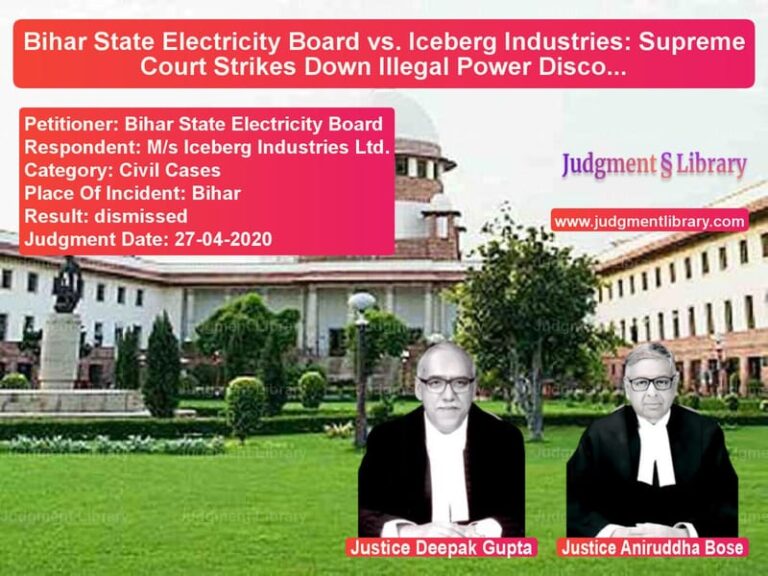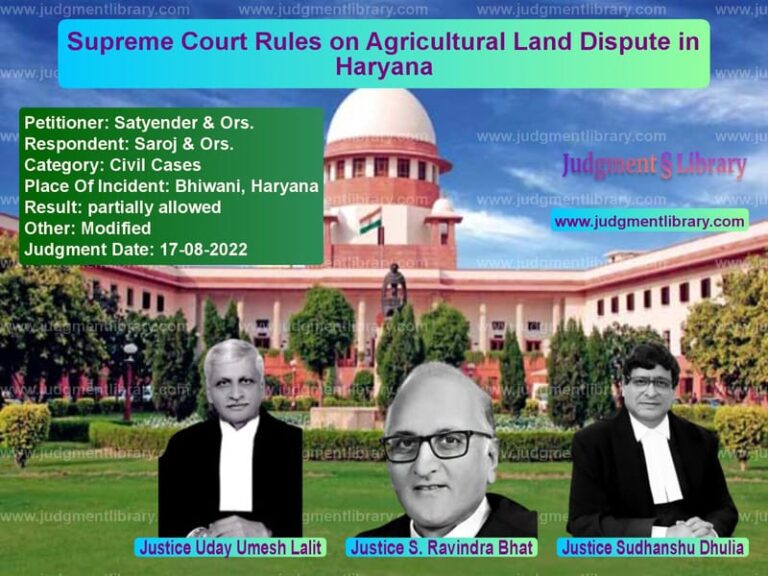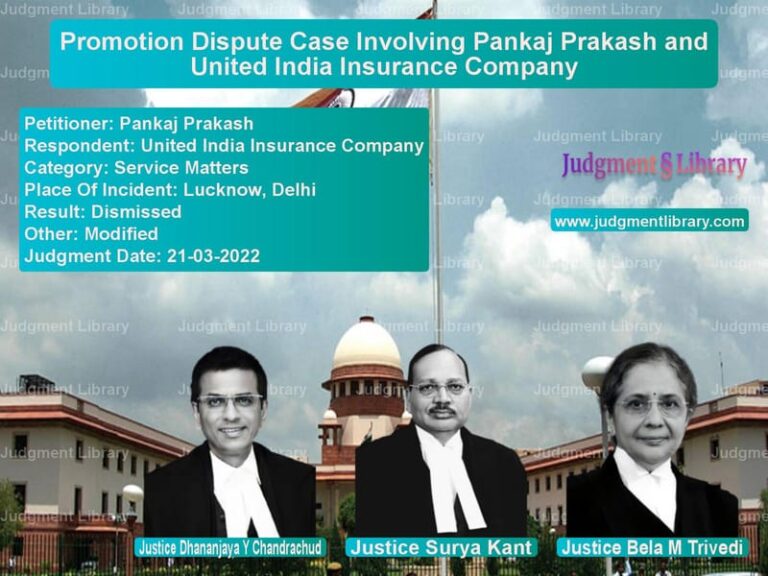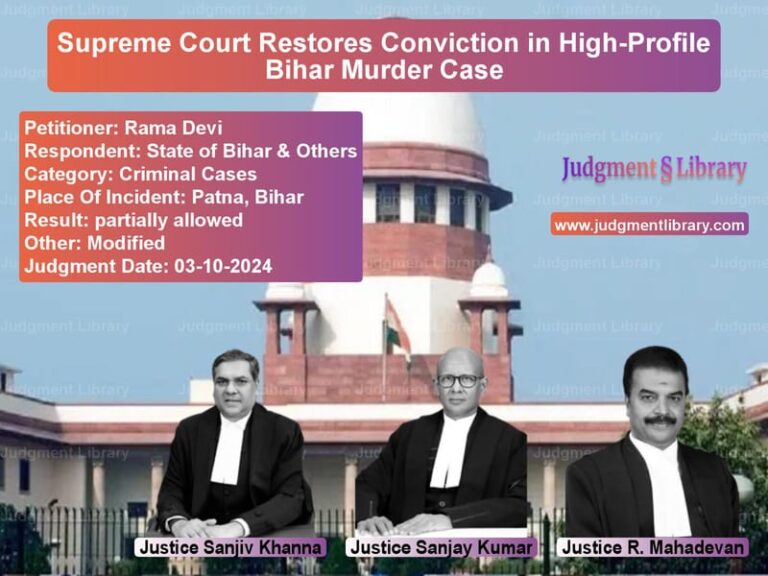Contractual Interpretation and Tenancy Rights: Supreme Court Restores Business License Agreement
The Supreme Court of India has ruled in favor of the appellant in the case of Mangala Waman Karandikar (D) Tr. Lrs. v. Prakash Damodar Ranade, setting aside a Bombay High Court decision that had wrongly classified a business license agreement as a tenancy under the Bombay Rent Act. The judgment reinstates the trial court’s decree, confirming that the agreement was for the continuation of an existing business and not a lease of the premises.
Background of the Case
The dispute arose from an agreement dated February 7, 1963, between Mangala Waman Karandikar and Prakash Damodar Ranade. The agreement concerned a stationery business called “Karandikar Brothers” in Pune, initially run by the appellant’s husband before his demise in 1962. The appellant continued the business for a while but later decided to allow the respondent to operate it under a written agreement.
The agreement stipulated that:
- The respondent would run the stationery business for a period of two years from February 1, 1963, to January 31, 1965.
- The appellant would continue paying rent to the property owner, and the respondent would pay a monthly royalty of Rs. 90 for running the business.
Over time, the contract was extended periodically. However, in 1980, the appellant decided to resume the business and issued a notice to vacate by January 31, 1981. The respondent refused, arguing that he had acquired tenancy rights under Section 15A of the Bombay Rent Act. This led the appellant to file a civil suit in 1981, seeking possession of the shop premises.
Trial Court and First Appellate Court’s Findings
The trial court, in its judgment dated August 30, 1988, ruled in favor of the appellant, holding that:
- The agreement was for running the business, not a rental arrangement.
- The respondent failed to prove that he was a licensee of the shop premises.
- The use of the word “shop” referred to the business, not the property itself.
The appellate court upheld this decision on July 29, 1991, affirming that the contract did not create tenancy rights under the Bombay Rent Act.
High Court Reverses the Decision
The Bombay High Court, in its ruling dated November 7, 2009, overturned both lower court decisions, holding that:
- The agreement created a license to use the premises, making the respondent a protected tenant under Section 15A of the Bombay Rent Act.
- The trial court lacked jurisdiction, as cases under the Bombay Rent Act should be tried by the Small Causes Court.
Supreme Court’s Observations and Judgment
1. Interpretation of the Contract
The Supreme Court emphasized that contractual interpretation should be based on the clear language of the agreement. It noted:
“It is clear from the reading of the contract that the parties had intended to transfer business from the appellant to the respondent during the contractual period. This agreement was not meant as a lease or license for the respondent to conduct business.”
2. Limitation of Extrinsic Evidence
The Court rejected the High Court’s reliance on extrinsic evidence, such as payment receipts labeled as “rent.” It clarified that under Sections 92 and 95 of the Indian Evidence Act:
“When a document is straightforward and presents no difficulty in construing it, extrinsic evidence cannot be used to alter its meaning.”
3. Application of the Bombay Rent Act
The Supreme Court ruled that the agreement did not fall under the Bombay Rent Act, stating:
“Once we have determined that the impugned agreement was a license for continuing an existing business, the Bombay Rent Act does not cover such arrangements.”
4. High Court’s Error in Jurisdiction
The Court held that the High Court erred in ruling that the trial court lacked jurisdiction. Since the agreement was not a lease, the case did not require adjudication under the Bombay Rent Act by the Small Causes Court.
Read also: https://judgmentlibrary.com/electricity-load-reduction-dispute-jharkhand-high-court-verdict-upheld/
Final Verdict
The Supreme Court set aside the Bombay High Court’s ruling and reinstated the trial court’s decree, stating:
“The evidence points that the license was created for continuation of the existing business rather than as a license/lease of the shop premises. The High Court erred in appreciating the ambit of Section 95 of the Indian Evidence Act.”
Accordingly, the respondent was directed to vacate the premises and hand over possession to the appellant.
Conclusion
The Supreme Court’s judgment provides clarity on the distinction between business license agreements and tenancy under the Bombay Rent Act. It reinforces that clear contractual language prevails over extrinsic evidence and that courts should not reinterpret agreements contrary to the parties’ original intent.
Petitioner Name: Mangala Waman Karandikar (D) Tr. Lrs..Respondent Name: Prakash Damodar Ranade.Judgment By: Justice N.V. Ramana, Justice Surya Kant, Justice Aniruddha Bose.Place Of Incident: Pune.Judgment Date: 07-05-2021.
Don’t miss out on the full details! Download the complete judgment in PDF format below and gain valuable insights instantly!
Download Judgment: mangala-waman-karand-vs-prakash-damodar-rana-supreme-court-of-india-judgment-dated-07-05-2021.pdf
Directly Download Judgment: Directly download this Judgment
See all petitions in Contract Disputes
See all petitions in Property Disputes
See all petitions in Judgment by N.V. Ramana
See all petitions in Judgment by Surya Kant
See all petitions in Judgment by Aniruddha Bose
See all petitions in allowed
See all petitions in Reversed
See all petitions in supreme court of India judgments May 2021
See all petitions in 2021 judgments
See all posts in Civil Cases Category
See all allowed petitions in Civil Cases Category
See all Dismissed petitions in Civil Cases Category
See all partially allowed petitions in Civil Cases Category

